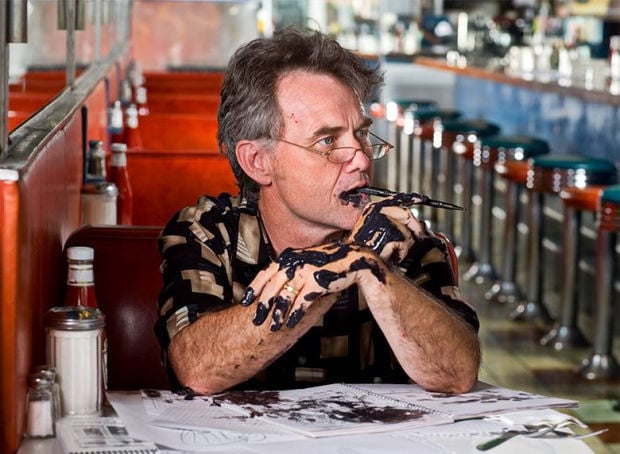I saw my 83-year-old friend, Dr. Jason Miller, waiting outside Wildflower, enjoying a chat with a lovely stranger. Later, over lunch, Doc said, “She thanked me for my service. And in the kindest way possible I said, ‘Don’t thank me for being part of a war that killed a million and half people, lady.’ Say, ‘Welcome home.’” He smiled tenderly. “A lot of us never heard that.”
It was 50 years ago when my brothers, Don and Bob, came home from Vietnam. To silence. For a lesson we didn’t learn.
Doctor J was against the war when he was drafted right out of medical school, he was against it when he was a surgeon knee-deep in gore in a field hospital, he was against it when he defied policy by treating injured civilians and he was against it when he made a woodcarving of Pogo emblazoned with the words, “We have met the enemy and he is us.”
Decades later, Pogo is on my wall. Thanks, Doc. Over lunch we usually talk about whatever medical mission he’s organizing to Mexico or Colombia or God knows where. Not this time. This time Doc opened up. About Vietnam. As we perused the menus.
Doc told me he triaged the wounded at a site where over 300 marines had been killed.
I told Doc I wrote letters to both of my brothers — The Officer, and The Medic — when I was in junior high. I wrote about school. Mom. Dad. Zits. Jokes. Kid stuff. The Medic sent me Vietnamese coins. When we heard Cronkite narrating grainy white news footage from Vietnam we all looked for my brothers on the Magnavox.
Doc told me about the time a young soldier stepped on a Claymore mine. Blew his bowels out of his body. Slaughtering pigs on the farm back home helped Doc find the artery with terrifying objectivity.
I ordered soup.
He told me how he chose to “win hearts and minds” by venturing into the jungle to patch up civilians — when he wasn’t patching up Americans. Must have been terrifying.
My closest brother said it was. “I was scared the minute I stepped off the plane in Cam Ranh Bay. I didn’t stop being scared until I stepped back on that thing a year later.”
Doc told me about the day some villagers directed him to a wounded child. Doc knelt to treat him. Heard a gun cocked behind his head. He turned. A North Vietnamese Army regular pointing his gun directly at his face was shouting at him. A woman began shrieking. The boy’s mother? Doc desperately mimed that he meant no harm, stopped the boy’s bleeding with a tourniquet, gave the mother some meds for her child and backed slowly out of the village.
Lunch came. Artichokes and salads.
Doc usually told stories like the one about the little girl in Mexico with a hole in her heart. He raised the funds, brought her here, got her healed and returned her home. He’s full of stories about practicing the healing arts in impoverished communities. Or in the poorest corners of this nation.
Doc was sent north to the DMZ. “I ended up in a classic ambush. River to our right, jungle to our left; VC firing down on us. The other COs were picked off, making me the commanding officer. And the only medic.” Bullets flew as the wounded men crawled through the mud toward him.
Air support came. Napalm.
They fought to an open area where a copter dropped a rope line. “I was the last to climb up the rope.” Pang. Pang. Pang. A rotor was hit. The copter rocked and plummeted. “I jumped out. Landed hard. Dislocated my hip. I stabbed morphine into my arm and told the Marine next to me to plant his foot in my crotch, use my ankle as a fulcrum and pop my leg back into my hip socket.”
The VC taunted us. “We see you. We are going to kill you.”
Finally. A second copter came. “When I got back behind the wire it took three days for my pulse to return to normal.”
We discussed napalm, agent orange, suicide and depression. And ordered no dessert.
Doc told me of a time when, trudging into another endless jungle, he couldn’t take it anymore. Put his pistol to his temple. The corpsman behind him wrestled it away. And sedated him. “When I came to he told me, ‘The men need you.’ ”
At this point Doc looked away from me. “Told that corpsman the same exact thing the day before. I threatened to court-martial him for bellyaching about the war I hated more than he did. Made him my second. He saved my life.”
Check came. Doc insisted we go dutch.
Half a century out, Doc wants to return to the jungle. He’s plotting to go to Cúcuta, Colombia, “in 3 or 4 months.” He needs skilled volunteers, nurses and medics who will work with him at the 400-bed hospital he’s eyeing. “Come with me.”
“I can’t even work a Band-Aid. I think I’ll stay here and write a novel about your life.”
He laughed.





